Howard Schultz Is Running on Behalf of Polite Rich People
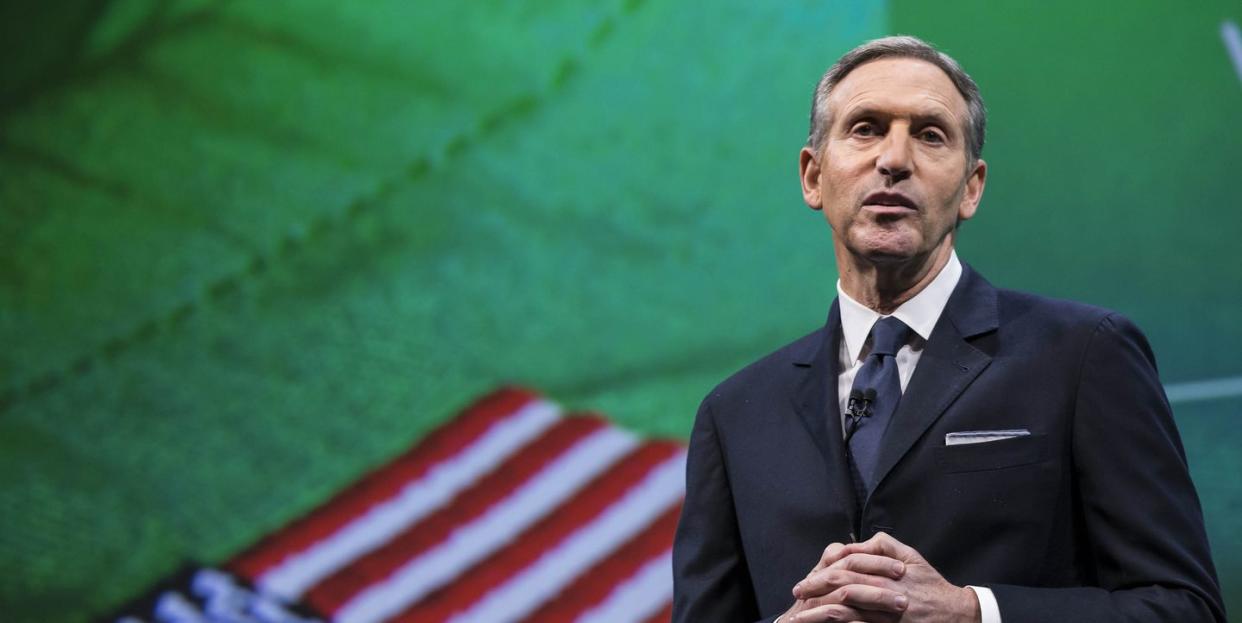
When you've made $2.7 billion-nearly three thousand million dollars-it must be easy to believe you've got talent so extraordinary that it borders on magical power. Not many other people have made that much money. That you did surely proves you harnessed your gifts, and put in some hard work and grit and determination, in a way no one else was able or willing. If you can do that, you can do pretty much anything-a belief you can reinforce by paying people to tell you that, yes, you can do that. This appears to be what's powering Howard Schultz, the former Starbucks CEO who now thinks he has what it takes to save America. So he's "seriously considering" a run for president.
Schultz has embarked on a PR blitz over the last few days, and has earned himself an impressive amount of free media. Not much of that coverage has been positive, probably because he has proven himself almost uniquely adept at misreading the political moment. This is not exactly gobsmacking, considering he's the same guy who once instructed his employees to write "Race Together" on Starbucks cups in order to force conversations on race issues with customers before they'd had their morning coffee. This initiative was greeted by a rare moment of unity across the political spectrum, as pretty much everyone agreed it was idiotic. The reception was so bad that Schultz deactivated his Twitter account, which he re-launched this week to fire off three tweets, all of which got Ratioed.
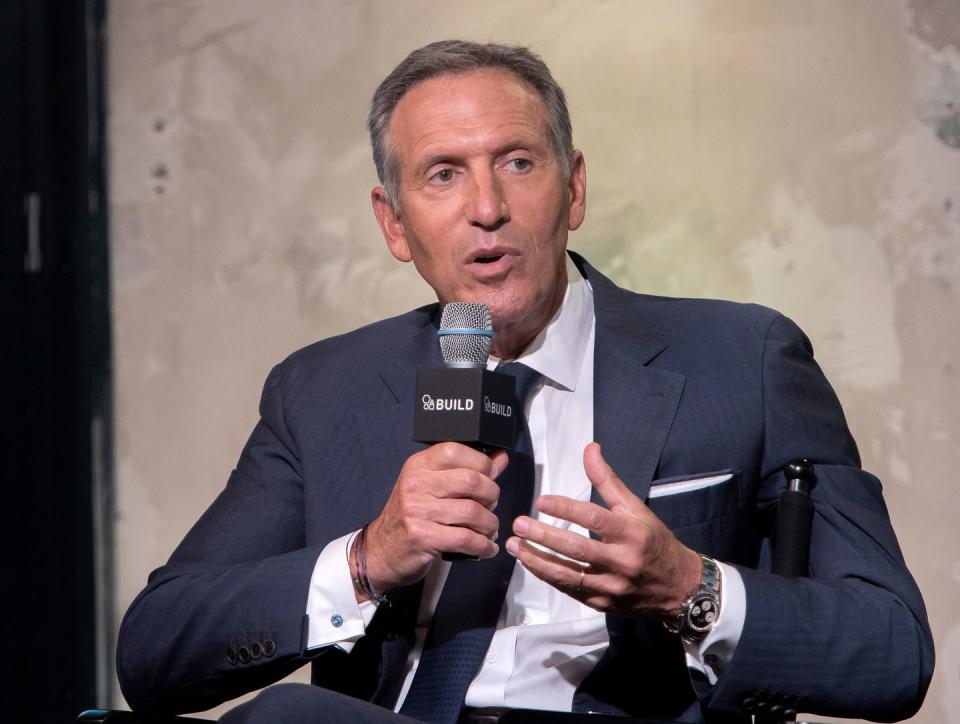
The early signs are that his candidacy may also unite otherwise sworn enemies in pity and disgust. Schultz, it increasingly seems, is unable to grasp politics in general. A self-declared lifelong Democrat, Schultz has set himself up as a "centrist independent" in interviews with 60 Minutes and The New York Times. This earned immediate rebukes from Democrats and fellow billionaire centrist Michael Bloomberg, all of whom think Schultz could split the anti-Trump vote if he runs as a third-party spoiler and possibly throw the election to the Tangerine Generalissimo.
This was the sentiment that greeted Schultz at a book-signing event in New York City on Monday night:
Literally 30 seconds into Howard Schultz’s appearance in NY, there’s a heckler telling him “don’t re-elect Trump.” The heckler also mentions how Schultz keeps getting ratio-ed. pic.twitter.com/Q6FUnT8YX8
- Max Tani (@maxwelltani) January 29, 2019
Bloomberg, for his part, is working off experience: he scoured the polling data in 2016 and elected not to run for exactly this reason. In today's climate, it's a reasonable concern: having lost some non-college-educated white voters to Trump, Democrats may lean on some college-educated suburban whites who have become disenchanted with the Trumpian approach of governing from manufactured crisis to self-inflicted fiasco, all while being an asshole to everyone who doesn't praise you on the TV. If there is any kind of natural constituency for a presidential bid from Howard Schultz-which assumes facts not in evidence-it would probably be well-off suburban white people who are wary of Democrats who are pledging to raise taxes to fund social programs.
If you're looking for more evidence a Schultz run could provide Trump with a better path to re-election, you only need to look to how the president is reacting to this development.
Trump told the crowd at the Trump Hotel tonight fundraiser that he was trying to get Howard Schultz into the race with his tweet earlier today because he thinks he'll help him, per attendee.
- Maggie Haberman (@maggieNYT) January 29, 2019
And the very next morning, Trump's pravda network jumped into action to hold what they've surely identified as the party line:
Ainsley Earhardt on Howard Schultz being heckled: “So ‘billionaire’ is a bad word now? Can’t make money.” pic.twitter.com/n8IAulLyzB
- Bobby Lewis (@revrrlewis) January 29, 2019
Fox News is a dependable ally to all rich people, but surely there's a reason they've chosen to defend Schultz, specifically, right now. It is not because they believe he will remove Donald Trump from the White House.
Schultz is paying some prominent Republican and Democratic strategists-including MSNBC contributor Steve Schmidt and former Obama aide Bill Burton-to advise him on all this. He is likely forking over portions of his $2.7 billion net worth that are insignificant to him, but nonetheless very significant to these political consultants. It's hard to see these guys-who surely do not believe Schultz has a chance to become President of the United States but took the job anyway-telling him that he doesn't have a prayer when we're so far out from the actual contest and they've only just boarded the gravy train. But if Schultz is looking for a dose of reality-again, assumes facts not in evidence-then he doesn't even need to look to any op-ed page or Tweet Ratio. Just look at what the president and his apparatchiks think about his burgeoning political career.
One reason Schultz is no meteoric political talent is that, beyond any charisma deficiencies, he seems to believe being a "centrist independent" means you won't do much of anything-or at least nothing specific. Schultz's political views derive almost exclusively from the Church of Both Sides, the religion practiced in cable-news green rooms where Both Parties are Too Extreme, and the American People are Somewhere in the Center. Schultz even went so far as to call them the "silent majority," another display of his political savvy in that it's a callback to the race-baiting tactics of Richard Nixon's Southern Strategy. It also came up in more recent times.
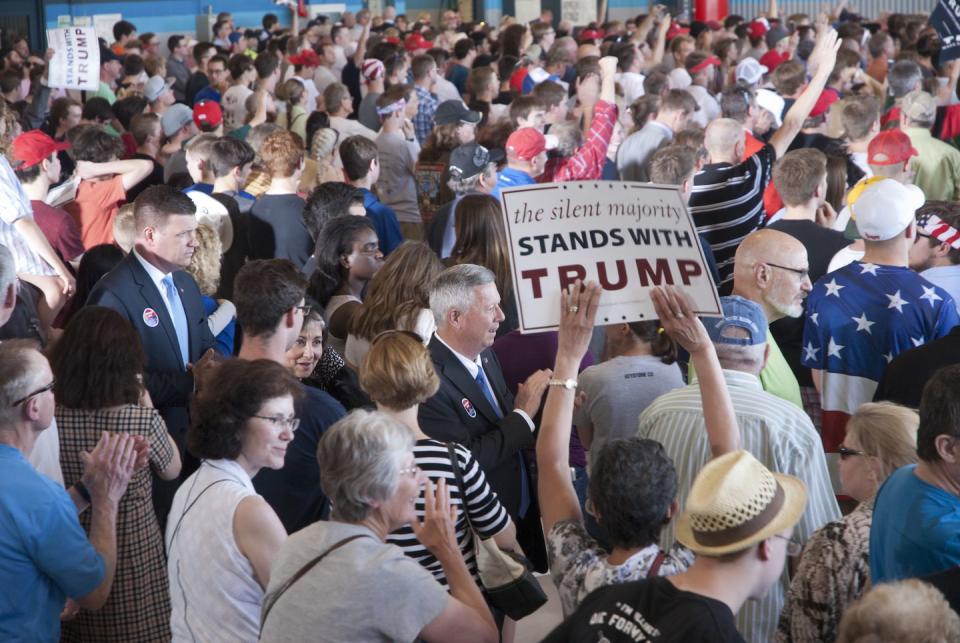
The defining gospel of the Church of Both Sides, besides the belief everyone should be more civil, is the idea the national debt is a guillotine hanging over the American republic. There are plenty of arguments against this as a basic principle. The dollar is the world's reserve currency, so the idea our debt will collapse the economy in the near or even medium turn is way overblown. Moreover, the gravity of the debt problem is closely tied to the consensus-built over just the last few decades-that Wall Street is responsible for creating money in our society through loans, while the government should back away from its method of creating money-running deficits.
Another argument that the debt isn't actually that pressing-or at least, that many people who talk about it don't actually care-is that Republicans continually run up the deficit with debt-financed tax cuts. For 40 years, they have claimed these will "pay for themselves" through economic growth, a theory based on a graph drawn on a napkin that has never, ever proven true. Just look at Kansas. Or the whole country, which was subjected to the Republican tax cut in 2017. It boosted GDP growth but barely even began to pay for itself, and also led to only modest hiring gains and no real wage improvements. That may be because the massive corporations who benefited most mostly used their savings on stock buybacks-a method of boosting share price in the short term, which in turn boosts the CEO's annual compensation-rather than on innovation or expansion. Schultz said the Republican cuts were a bit too generous to companies and insufficiently so to working people, but has largely refused to get specific on what he'd do on taxes.
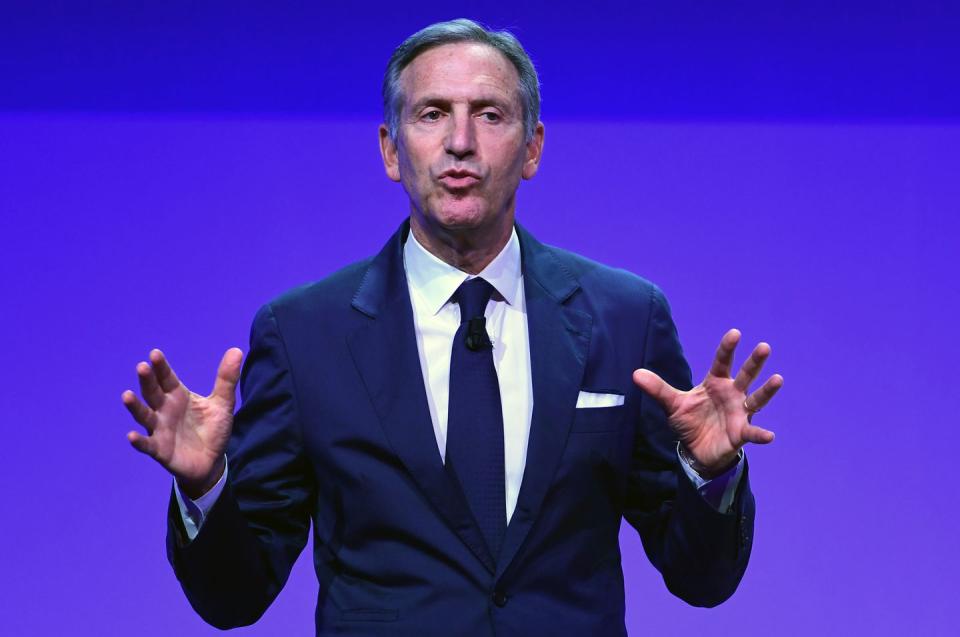
But even if the national debt is a huge problem we must solve in the medium term, it is not the most pressing issue of this political moment. Or, more to the point: balancing the budget will not solve any of the deep structural problems fueling the political extremism and social dysfunction in our society. The foremost issues in that regard are wealth inequality and decaying social mobility, on which Schultz has already staked out a familiar position: admitting there's a problem, but dismissing actual transformative solutions as too costly and unrealistic:
There is a problem that she has identified, but I think the way she’s going about it, unfortunately, [Alexandria Ocasio-Cortez is] a bit misinformed. The problem is we have significant inequality in the country. The problem is we have about 40 percent of American families that literally don’t have $400 for a crisis. We have roughly 5 million young people, many African American, Latino, that are not in school, not in work, and one of every six Americans are food-insecure every night.
This was a response to a question about Ocasio-Cortez's proposal for a 70 percent top marginal tax rate. It is, frankly, a way to redistribute wealth from the top 1 percent, which controls 40 percent of the pie (and the top 20 percent, which controls 90 percent) to the bottom 80 percent, which controls just 10 percent of the wealth. In most Democratic proposals, this would be through government-funded education and job training and healthcare programs that strengthen the social safety net and increase social mobility. Schultz opposes this, but does not seem to offer an alternative, likely because doing something would involve him losing money. Philosophically, Howard Schultz appears to believe the fact that people like him have billions of dollars is completely unrelated to the fact that 40 percent of Americans don't have $400 in savings.
In fact, he made this explicitly clear Monday night: “I respect the Democratic Party. I no longer feel affiliated because I don’t know their views represent the majority of Americans. I don’t think we want a 70 percent income tax in America." Except, at least according to the polling, he doesn't speak for the majority: 59 percent of registered voters support AOC's 70-percent top marginal rate in a recent poll. That is to say, Howard Schultz just doesn't want to pay a 70 percent tax-which would only apply to his income above $10 million-and neither do his rich friends. "The majority of Americans" just sounds better. He's running as an independent to prevent his taxes getting raised by a Democrat.

And this is the most basic argument against running another billionaire against the self-styled billionaire in the White House. Most people, particularly those who acquire billions of dollars, do not want to give up what they have. Fixing the American economy so that workers get a fairer share of the pie will involve the obscenely rich giving up some of what they have, now or at least going forward. More than that, extremely rich people almost always struggle to grasp the problems facing working people because, over the years, they've just grown so disconnected from those lives.
That was part of the problem that faced Hillary Clinton in 2016, a very qualified candidate who believed, based on the stock market and speaking to pretty much everyone she knew, that the economy was on a big-time rebound under Obama and that she could run as largely an extension of his legacy. But 48 percent of Americans do not own any kind of stocks. The market doesn't affect them. And for many, their "real wages"-their pay when you account for the rising price of goods-have not budged much in decades. Many communities have not actually recovered from the Great Recession. This, too, is tied to an incentive structure in corporate America emphasizing short-term profits to maximize share price in the near term. The American economic system does not require modest tweaks, it requires a major overhaul where the vast majority of people get a much larger share of the pie than they currently do.
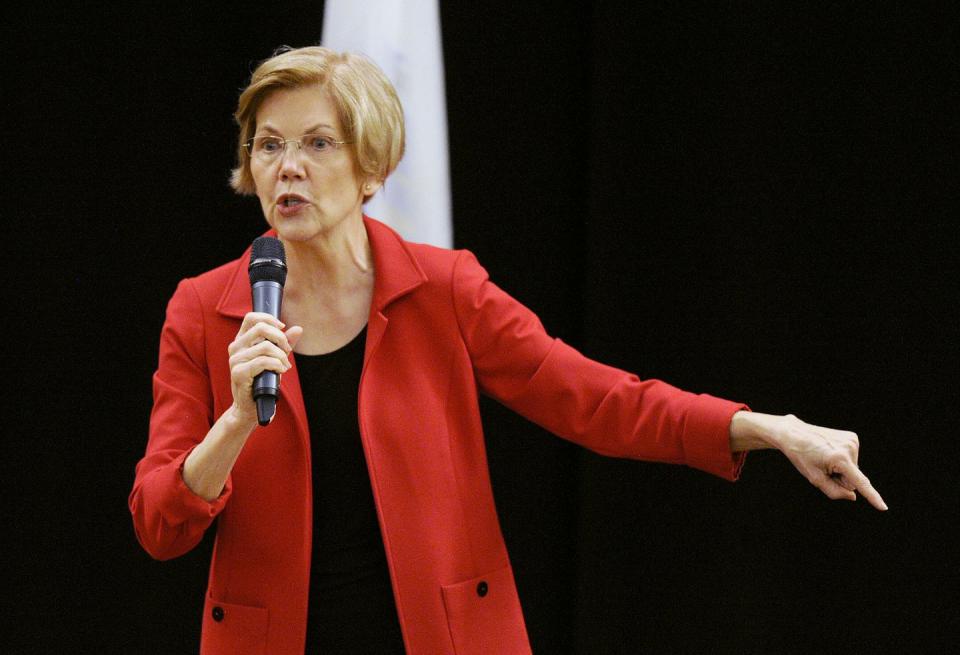
These are the kind of problems identified by a candidate like Elizabeth Warren, surely one of those Schultz has deemed too far to the left, who has proposed workers should elect 40 percent of their corporation's board and floated a "wealth tax" of 2 percent above $50 million and 3 percent above $1 billion. This is based on the idea the short-termism of the American economy is robbing workers of just desserts and pushing it upwards towards a small cadre of executive types who then get a tax cut every time Republicans sweep into power. Schultz, if he is aware of these structural issues, is not proposing anything specific to deal with them. Maybe that's because he was very recently an executive at a major corporation, and would not have enjoyed having to cater to the interests of workers-particularly if it affected the share price. But the idea share price is the only concern for a corporate executive is, again, a relatively recent development.
Schultz's belief that most Americans agree with him seems to be rooted in a single data point he cited on 60 Minutes: that around 40 percent identify as "independents." That's true, but it has no actual bearing on what kind of policies they favor. First of all, most independents "lean" Democratic or Republican-they almost always vote that way. Most people just like to think of themselves as "independent thinkers" or otherwise immune to groupthink. Second of all, Schultz's brand of national-debt obsessed centrism isn't reflected in other polling. In general, three quarters of Americans favor higher taxes on the wealthy. In the poll showing 59 percent support AOC's top marginal tax rate of 70 percent, 60 percent of the independents Schultz claims to represent also support it. 45 percent of Republicans support it. 55 percent of Republicans oppose it, so it sounds like Schultz represents Republican voters on that issue.
In fact, he sounds-if not conservative-than resigned to a slightly modified status quo on a number of issues:
Former Starbucks CEO Howard Schultz says he’s strongly considering running for president in 2020. Where does the billionaire Independent stand on key issues facing our country? https://t.co/b6zijMBLs7 pic.twitter.com/0O2jh56AB2
- 60 Minutes (@60Minutes) January 28, 2019
Medicare For All is as unrealistic as The Wall? Even if you ignore that most every other industrialized nation has universal healthcare, just look at a study from George Mason University, one of the most conservative shops around, which found Bernie Sanders' MFA plan would cost less than our current system is projected to over the same period. Also, it would insure 30 million more people. Also, it's not "free," as Schultz said-it's paid for with tax dollars instead of insurance premiums. Also, 70 percent of Americans support it. But Schultz is trapped in a delusion courtesy of the Both Sides gospel, a steadfast belief that you cannot do anything ambitious because of the Debt Guillotine. Notice he said everyone should have "the right to access to quality healthcare." Nowhere did he say they could afford it. This is very similar to the rhetoric Paul Ryan would trot out while trying to force through the various Republican healthcare bills.
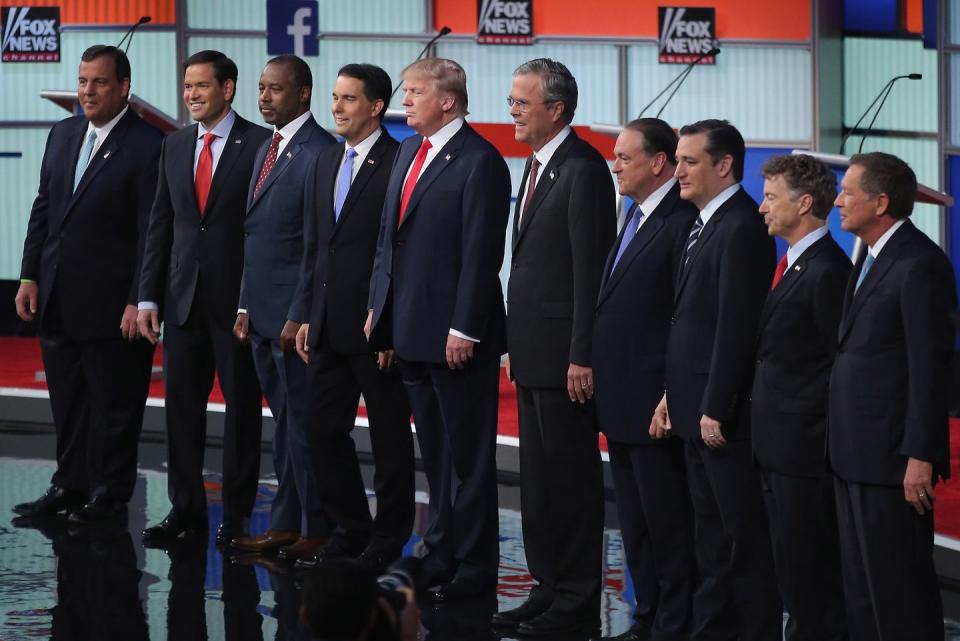
In effect, Howard Schultz has positioned himself as a ludicrously rich would-be technocrat somewhere between Hillary Clinton and milquetoast Jeb Bush-style Republicans on the political spectrum. He's socially liberal and accepts the scientific consensus on climate change, but basically opposes any major changes to the economic system. (This may or may not have to do with a belief that the stratospheric degree of his financial success is unrelated to structural inequities in that system.) You may have noticed Donald Trump defeated all these people, albeit, in the case of Clinton, using a quirk of our electoral system. If we learned anything from 2016, it's that the country now demands someone who will understand the problems working people face and the visceral rage that our decades-long insistence on exacerbating those problems has created. Howard Schultz is not that candidate, because Howard Schultz has nearly three billion dollars and thinks racism can be addressed via notes on a coffee cup.
We don't need someone who thinks Donald Trump is rude and he cut taxes on rich people a little bit too much. Trump will not be the last racist authoritarian the Republican base nominates if we fail to address the economic despair that drives people at the fringes of his movement to throw in with him on the basis that the other option is the status quo. As we've seen these last few years, the country is ripe for fascism. Howard Schultz should stay on the sidelines, in his luxury box, and pay whatever relatively modest tax is levied on him by someone with an actual grasp on the existential threats facing American society. He could use the money he'll save by firing the political consultants who don't actually think he can win anyway.
('You Might Also Like',)

